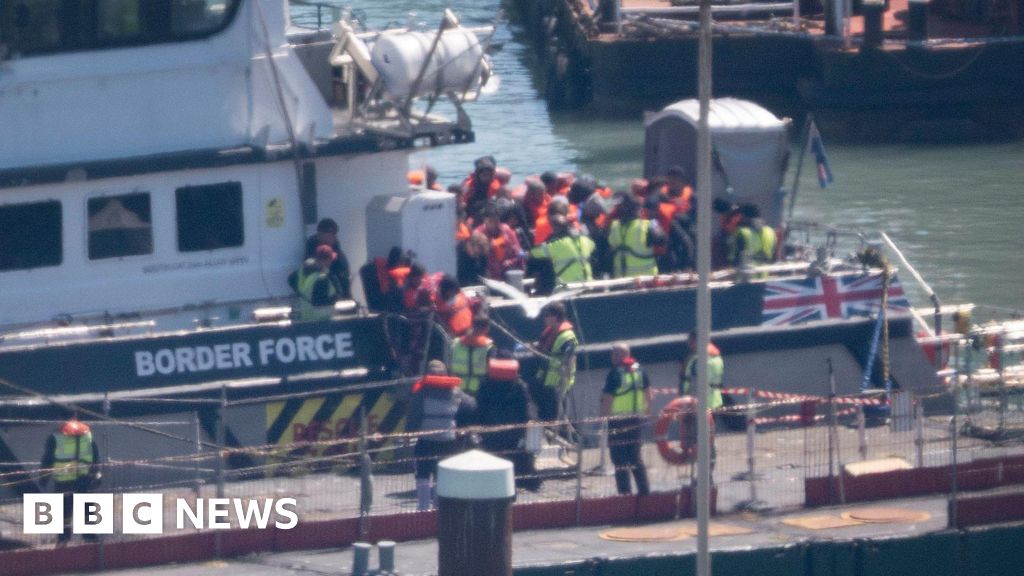ARTICLE AD BOX
Priti Patel had to personally approve plans to send some asylum seekers from the UK to Rwanda after her officials voiced concerns about the scheme's value for money.
The home secretary took the rare step of issuing a "ministerial direction" to push through the scheme, meaning she takes personal responsibility for it.
It is only the second time the Home Office has used the power in 30 years.
It comes as the UN refugee agency said the plans breached international law.
Home Office civil servants could not precisely quantify the benefits of the policy, and uncertainty about the costs meant Ms Patel had to take personal responsibility for it by issuing the ministerial direction.
A source close to the home secretary said "deterring illegal entry would create significant savings" and the fact that the savings could not be quantified precisely should not prevent action from being taken.
Ministerial directions have been used 46 times since the 2010 election, with two in the Home Office since 1990, according to the Institute for Government think tank.
The only other time the formal order was used by the Home Office was in 2019 by the former home secretary Sajid Javid, to bring in the Windrush Compensation Scheme before legislation was in place.
Under the £120m pilot scheme, people deemed to have entered the UK unlawfully since 1 January could be flown to Rwanda, where they will be allowed to apply for the right to settle in the east African country.
The government said the first flights could begin within weeks, initially focusing on single men who crossed the Channel in small boats or lorries.
The use of a ministerial direction highlights the unconventional nature of the government's refugee relocation plan.
As well as criticism of the policy on legal, moral and logistical grounds there is concern from officials at the home office about the cost.
The department couldn't say whether the scheme would be value for money, which is perhaps not surprising given ministers have openly admitted they don't know how much money will need to be spent.
Flying asylum seekers to another country is not a world first but it's a new and controversial approach for the UK.
The policy is testing the reach of the government's powers.
More than 160 charities and campaign groups have urged ministers to scrap the policy - which has also drawn criticism from opposition parties and some Conservatives.
Labour's shadow justice minister Ellie Reeves said the scheme was "unethical and unworkable" and would fail to deter people from crossing the Channel.
Liberal Democrat leader Sir Ed Davey said the scheme would be a "bureaucratic nightmare" and claimed it had been announced as part of a "cynical distraction" from the Partygate scandal surrounding No 10.
Ian Blackford, the SNP's Westminster leader, said it was "chilling" to think "vulnerable people" trying to enter the UK would be processed in Rwanda, before describing the plans as "evil".
The UNHCR said attempting to "shift responsibility" for claims of refugee status was "unacceptable".
Gillian Triggs, an assistant secretary-general at the agency, said such a policy- which is similarly used in Australia - could be effective as a deterrent but there were "much more legally effective ways of achieving the same outcome".
Australia has used offshore detention centres since 2001, with thousands of asylum seekers being transferred out of the country since then.
It has been frequently criticised by the UN and rights groups over substandard conditions at its centres and its own projections show it will spend $811.8m (£460m) on offshore processing in 2021-22.
Last year, the UK government raised concerns at the UN about claims of "extrajudicial killings, deaths in custody, enforced disappearances and torture" in Rwanda, as well as restrictions to civil and political rights.
But justice and migration minister Tom Pursglove said Rwanda was a progressive country that wanted to provide sanctuary and had made "huge strides forward" in the past three decades.
Mr Pursglove argued that while the short-term costs would be "pretty equivalent" to what the UK is paying currently to accommodate those claiming asylum, the new scheme would save British taxpayers money in the "longer term".
Speaking to ITV's Good Morning Britain on Friday, he said: "We are spending £5m per day accommodating individuals who are crossing in hotels. That is not sustainable and is not acceptable and we have to get that under control."
The scheme comes as part of broader efforts to cut the number of people entering the UK by crossing the Channel in small boats - with the Royal Navy taking operational command of patrolling the Channel from UK Border Force.
Some 562 people on 14 boats made the journey on the day the policy was unveiled, according to the Ministry of Defence. No-one making the crossing was believed to have arrived on UK soil "on their own terms", it added.
Last year, 28,526 people made the crossing, up from 8,404 in 2020.

 3 years ago
58
3 years ago
58








 English (US) ·
English (US) ·